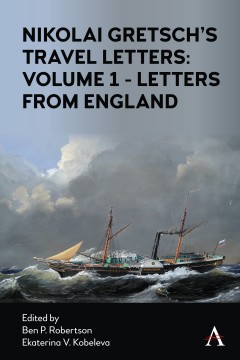Nikolai Gretsch's Travel Letters: Volume 1 - Letters from England
By Nikolai Gretsch
Edited by Ben P. Robertson & Ekaterina V. Kobeleva
Gender and Culture in the Romantic Era, 1780–1830 Anthem Studies in Travel
Other Formats Available:
E-Book- About This Book
- Reviews
- Author Information
- Series
- Table of Contents
- Links
- Podcasts
About This Book
Nikolai Gretsch's Travel Letters is a fully translated English edition of a three-volume account published by Nikolai Gretsch (1787–1867) in Russian in 1839. In the original Russian, Gretsch describes his travels in post-Napoleonic England, France, and Germany in 1837 at the behest of the Russian Empire.
Gretsch had been asked to travel into Western Europe to examine the educational systems and report his findings to the Russian government. However, he was more than just a functionary. He was a journalist, novelist, and philologist. For nearly three decades, he published a journal called Son of the Fatherland, and he was able to convince many influential Russian thinkers of the time to contribute to the periodical. Later, he would publish The Reader’s Library and then The Northern Bee. The former was a short-lived magazine, but the latter was a newspaper that remained in circulation for almost three decades. As these accomplishments suggest, Gretsch was an intellectual—a person who looked beyond the surface-level of his existence to seek deeper meaning.
In consequence, as he travelled through England, France, and Germany, his sharp mind absorbed far more than just the details of the educational systems he had been sent to investigate. He noticed the cultural norms in his surroundings, the history of each country, and the personal experiences of the people he met. When he returned to Russia, Gretsch assembled his entertaining and often humorous personal observations into the three-volume edition that was published in St. Petersburg in 1839 — not long after Napoleon’s final defeat. His astute observations provide a rich contemporary resource for information about the countries he visited. The observations are all the more relevant since they come from the viewpoint of an outsider. Additionally, as a result of his government position, Gretsch was able to move in social circles that would have been closed to many other people. In England, he once found himself in the same room with the future Queen Victoria, for example, and in France, he had lunch with Victor Hugo. Given the new historicist slant of modern literary and cultural studies, Gretsch’s observations offer a treasure-trove of contextual information that will be valuable to history and literature scholars as well as to general readers interested in cultural interactions during the nineteenth century. This narrative has never before been translated into English in its entirety.
Reviews
“During his long and successful literary career, Nikolai Gretsch wore many hats—a philologist, pedagogue, writer, journalist, editor, and memoirist. The literary journal that he edited was instrumental in bringing all the best authors of the age to the Russian public. But less known are his accomplishments as a travel writer. An avid tourist, Gretsch crisscrossed many parts of Europe and wrote fascinating travelogues that are brimming with keen insights and vivid portraits of the European countryside, its history, and its notable personalities. Now, for the first time, we have his travel letters available in English. Lucidly translated and excellently edited by Ben P. Robertson and Ekaterina Kobeleva, this three-volume set offers us a unique opportunity to journey across post-Napoleonic Europe and see it through the perspicacious eyes of a witty, informed, and sophisticated observer. Highly recommended! — Alexander Mikaberidze, Louisiana State University, US
“Ben P. Robertson and Ekaterina V. Kobeleva’s deftly crafted edition of Nikolai Gretsch’s Travel Letters brings forth the verve and wit running through a Russian subject’s correspondence touching on daily and political life in post-Napoleonic Europe. Entertaining and informative, inflected by his personal preferences for monarchic Britain over monarchic France and the Kingdoms of Germany, Gretsch’s observations say much about the political and social conditions of his moment. The letters and their commentary are a delight to read.” — Verena Andermatt Conley, Harvard University, US
Author Information
Ben P. Robertson is professor of English at Troy University. He teaches writing and literature and is especially interested in transnational Romanticism.
Ekaterina Kobeleva is a Lecturer in English at Troy University. She teaches writing and world literature and has developed a special interest in translation techniques.
Series
Gender and Culture in the Romantic Era, 1780–1830
Anthem Studies in Travel
Table of Contents
List of Illustrations; Acknowledgments; Abbreviations; General Introduction; Chronology of Gretsch’s Life; Introduction to Volume 1; Preface; Letter I; Letter II; Letter III; Letter IV; Letter V; Letter VI; Letter VII; Letter VIII; Letter IX; Letter X; Letter XI; Letter XII; Letter XIII; Letter XIV; Letter XV; Letter XVI; Letter XVII; Index.
Links
Stay Updated
Information
Latest Tweets



